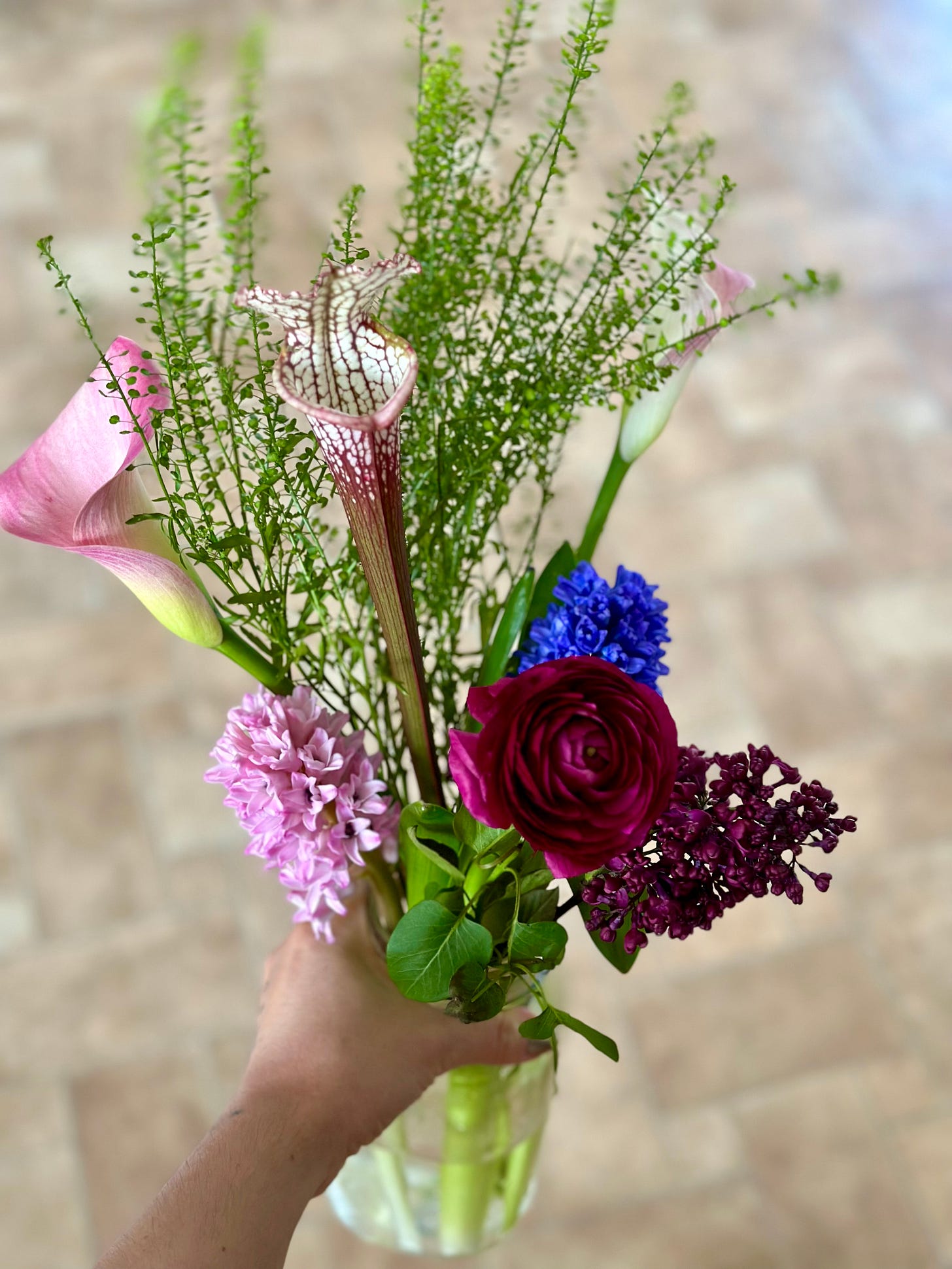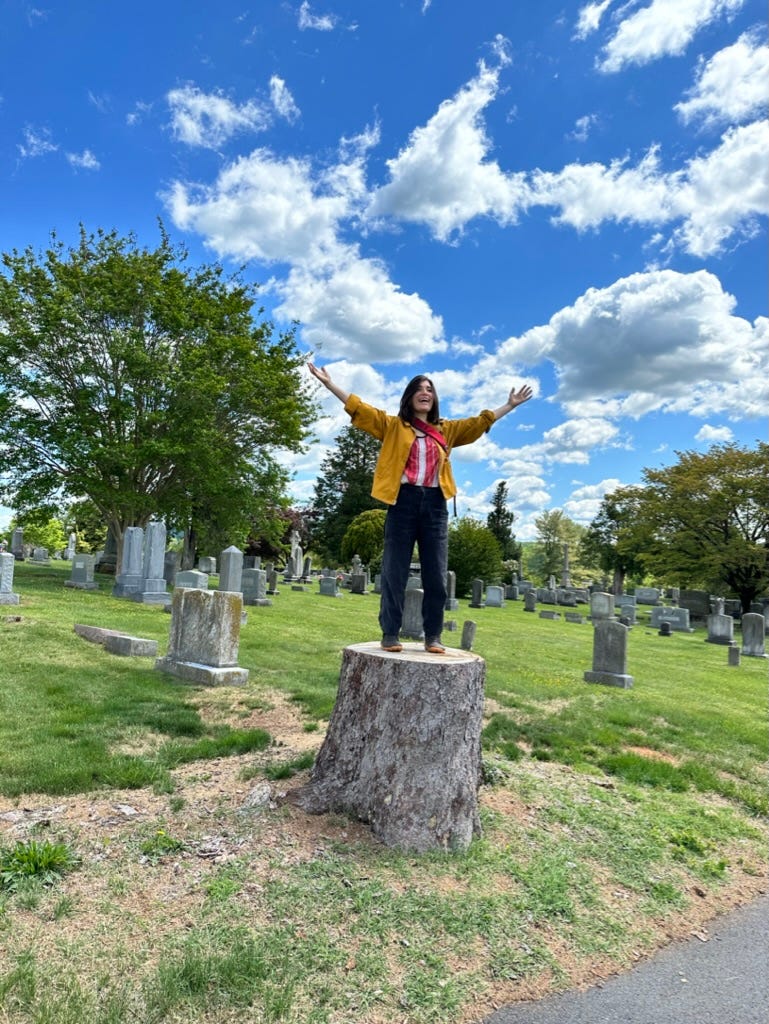Below, a talk I gave yesterday at Philips Exeter Academy Library.
All year, as I have been here at Phillips Exeter, I have paid attention to the trees. First the maples turning bright, then bare, those stark lines fragmenting the sky. I have walked in the woods for hours, turning left at the same place each time, at the little bench underneath a branch where the path turns into a portal, a door.
As I thought about my final reading, I paged through all the drafts from this year, all the unfinished pages, all the half-started stories and poems and essays. I imagined all the poems I’ve written at pop-ups on my typewriter, ink-smeared and filled with mistakes, close to 200, but gone from me now.
I kept thinking of the trees, bright and changing and blooming now, and I thought of how much I wanted to present something with a bow on it. Something shiny and polished and, for lack of better word, good. But it seems right, required even, that, I am coming here with open arms to say, I do not have it.
So let me start with the trees, the woods, the fullness of my days.
What this year has given me is something greater, even, than a finished thing— my life, in all its fullness, with so much more of my attention.
The writer Natalie Goldberg talks about how sometimes, writing is like drinking a glass of water, like watching the moon, like going to sleep. It is a way of being, as woven into a life as breath. It is noticing the aliveness contained in everything, and trusting the words to take you there. There is not always some great point to it, except being.
What I mean to tell you is that this year of spaciousness taught me about all the ways I’ve forced myself to walk a straight line instead of a spiral. All the times I’ve only written something so that it could become something I could “do something with,” whether that’s publish or put towards a new book or make perfect.
But here is this other way: writing to dredge up memories of first grade and sparkling red shoes and Simon G. kicking the principle in the shins. Writing to remember my high school and the smell of the field house and bending down to kiss the ground before the start of the 50 meter dash. Writing to remember being nineteen in Italy, taking a boat into a cavern where pools of water glowed from within, as if lit by spotlights, and being scared to jump in, but jumping anyways.
Writing to know the texture of grief.
Writing to know the texture of pain, confusion, love.
Writing like meditating, or walking, or waking.
This year taught me to write forwards, into, towards— my life, without knowing if it will ever become anything shiny and hard, something I could place into your hand like a glowing ember. This way, too, is worthy.
So many days these past nine months, I stared at the pages and pages of words scattered across my desk. I peered up at those circles above me in the library, I walked in loops in the woods. I watched rabbits cross the front yard, found an animal skull in the snow, put red lipstick on in the mirror and took it off again. I put my hand on my heart and said, it is okay if you go nowhere forward, but instead into the depths of unknowing.
So here is the map of where I am, this mystery place. and that feels like a very important place to report from.
One of my favorite poets, Emily Skaja, referred to herself as the, “high priestess of the not-quite.” I love that title so much, because it makes holy the unknowing, which does not have an end date, just a requirement to lean forward and find out.
As I wrote this year, I kept waiting to sense what it was all about, what it was becoming. and each time I heard, keep going, keep not knowing, keep putting your hands on the earth, keep making soup in the meantime, keep showing up to write poems for others, keep drinking too much coffee, keep being completely, immensely the you who is always changing.
One of the questions I was often asked this year was, “how do I find my voice, what is my voice like, how do I know if it’s me?” And I am here to say I share that question with you— and I offer the idea that we must always be listening to ourselves, we must resist permanence and settling into a rigid story about what we are like, what our creative work is like.
Here is a passage from my writing from sometime in January,
“I let the symbols come towards me. I radiate towards them and let them choose me and pick me up in their tired arms. I write the poems and I spend hours in the darkness in the cold in the light. I am shut away from the cycles of time. I am picking my way through the creative possibilities and letting them expand, dilate. Sometimes it is hard to ask for help but I am trying to hold myself to this task of asking. to celebrating the worlds in me. The many, many worlds. Each year, deeper. Each year, a lightness, and a knowing, and a newness, and a discovery, and a shut door, and a risk-taking, and a letting go, and a loosening of the bannisters. Each day sacred ground.”
That could be my manifesto. So instead of a finished thing, here are the stars burning bright in the cold. The mugs of half-drunk coffee, the humming spin of silence, the horses in the snow, the hours splitting open into butterflies.
Here are all the moments I got to write you a poem about grief or love or missing your mother or chocolate almond milk or god.
Here is tarnished green jewelry on my fingers and chipped nail polish and a thrift-store fur coat, and wondering, wondering.
I am not a finished thing. You are not a finished thing. I will not forget that. I will not forget to love you and me in our changing, difficult, beautiful, forms. I will keep bowing to the fragments and the ripped up pages and the mystery.
This year has helped me know we do not have to constantly be making something impressive to be worthy or lovable. That knowing is the greatest gift a writer, a person, could ask for. My gratitude is big as the moon. Big as the skyscrapers the first time I saw New York City. I will be saying thank you to this place, forward and backwards in time, not just today, but placing that thank you in my grandmother’s hands, in my great-great-great-grandmothers hands, in my future students’ hands, in the hands I will shake in greeting next year.
Let me say again what I’ve said to myself: you do not have to be constantly making something impressive to be worthy of a beautiful, full life.
With love,
Raisa






